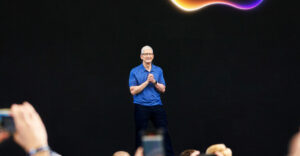
In the current US election, I would argue the winner actually will benefit from the excessive negative campaigning done by his opponent, who sacrificed trust and in many cases implied the U.S. voter was too stupid to go to the Web and look things up.
The well-executed Mac vs. Windows ads, while at least funny and entertaining, drifted from solid hits to outright hypocrisy as Vista was improved and Apple seemed unable to remember its own advantages. (Hint: As a percentage, Apple’s ratio of marketing dollars to development dollars leads the industry.)
Microsoft just announced Windows 7, and as a pre-beta product, it is very impressive, largely because Apple’s negative campaign against Windows Vista focused Microsoft more than I’ve ever seen a complex company focused. There is a rule here in the Silicon Valley, and that is that focusing Microsoft on you generally ends badly — and Microsoft actually hasn’t been focused on Apple since the early 90s.
In the U.S. election, the negative campaigning probably has done more to motivate the Democratic base and get moderate Republicans to switch sides than anything the Democrats could have done alone. Apple’s campaign has truly pissed off Microsoft, and Windows 7 is that company’s way of saying, “Steve Jobs can kiss my a**,” or more simply, “enough.”
We’ll close with a product that may indicate that Apple, by focusing on Vista, may have missed a huge fourth-quarter opportunity that HP should benefit from instead.
Windows 7 vs. Snow Leopard
Now, first realize that Windows 7 is pre-beta and that Microsoft could still screw it up, and we know very little, by design, about Snow Leopard.
However, Windows 7 attacks Apple’s historic inability to interoperate, successfully partner and work in the cloud — all of which suggest, if Microsoft executes, it will be the superior product. You can fix a product, but it is really hard to change the DNA of a company, and Apple has historically been its own worst enemy. This last is also true of Microsoft, and we’ll get to that in a moment.
Windows Live Essentials has components that bracket and match the photo and movie capabilities in iLife and is architected to be a cloud-based application. It can aggregate e-mail and photo services, and it includes e-mail and calendaring, out of Hotmail, that blends the online and offline experiences better than Apple has been able to accomplish to date with MobileMe. Add to this Office Live, which is free and many likely will be able to live in, and you have a significant solution advantage back on Microsoft’s side of the fence.
This focuses on systemic weakness: One, that Apple is a desktop vendor and has never really grasped anything of the scale of MSN, Hotmail, Exchange, SQL, or .Net. Both Microsoft and Apple were a joke in the back office in the ’80s and ’90s, with the Lisa and Scalability Day being two of the most stupid tech ventures in history, but Microsoft kept coming untill it got it right and Apple effectively gave up.
Apple weakness No. 2 is interoperability, and this is showcased by the Windows 7 Media player, which will work with non-DRM iTunes tracks, and you can even control Universal Plug and Play devices through it. These devices not only include the market-leading Sonos distributed music system, but also the PlayStation 3 — neither of which can be controlled from iTunes.
This also integrates with Microsoft Silverlight advancements showcased at the Professional Developers Conference by the BBC, which will allow people to start watching a TV show or movie on their TV or PC, and finish watching it on a laptop or compliant smartphone, including non-Microsoft products. One other product, Live Mesh, actually embraces the Mac as a full sync partner.
Finally, Apple believes that only Apple should have the freedom to choose; customers have to accept Apple’s choice, it’s partially the result of Apple’s “lock in” policy, an historic problem for Microsoft as well. Windows 7 effectively reverses a bad policy and will pass more control over to the users, OEMs, and IT managers than has ever before been granted. This will allow the proliferation of unique user experiences like the HP TouchSmart and products that improve on the Apple integrated experience but run Windows Applications.
Snow Leopard Will Have Advantages
One sustaining advantage that the Mac platform has is the ease in which Mac users can move from an old Mac to a new one. While migrating from Windows to a Mac is about as ugly as you can get, once on the Mac the process is comparatively painless. This is generally why Apple enjoys a higher customer churn rate than any other PC vendor, and it contributes to their higher margins and customer loyalty. Microsoft has closed — but far from eliminated — this gap, and it should be a higher priority than it is.
Technology vendors as a group, with Apple and increasingly HP (Great TouchSmart Ad) being exceptions, generally can’t market the benefits of their products. After seeing the last Apple announcement where folks other than Steve Jobs tried to present offerings, I do wonder whether Apple is drifting the wrong way. But to make Windows 7 truly step up to the opportunity, it will need an Apple-like roll-out, and I don’t yet see that capability in Microsoft.
Finally, the MacOS is penetration priced, and the choice is simple and elegant. There is only one. Microsoft doesn’t yet grasp that Windows is a keystone product and that much of its value to the company is based on what lies on top of it. If Microsoft did the same thing with the Xbox or IE that it does with Windows it would make Google, Sony, Nintendo, and Mozilla incredibly happy, and I would think, given the Apple ads, they would want to work a little harder to ruin Steve Jobs’ day. At some deep level, Microsoft needs to understand that mining Windows for cash is strategically very stupid.
Wrapping Up
The Democratic Party and Microsoft have always been larger but less focused than their counterparts. For the Republicans or Apple to actually fix their competitors’ focus problems will likely be seen, in hindsight, as a really stupid thing to do. Apple would have been better off to fix its crappy laptop keyboards (seriously — compare a ThinkPad and MacBook keyboard) and figure out how to do touchscreens on PCs (multi-touch track pads are just lame compared to things like the iPhone and TouchSmart).
And had the Republicans done their homework and cleaned house, they might have won.
Product of the Week
The HP Mini 1000 is my product of the week this week because, with the economy in the crapper, lots of folks simply can’t afford paying US$1,000 or more for a new computer. Yet they still want something that looks good, that makes them proud to carry it, and that is focused on the future. This is arguably the best netbook so far, and its entry price of below $400 combined with its small size and sexy design make this an ideal product for the time and something I think most would be proud to own.
There is even a Vivienne Tam edition for women which is both stylish and affordable. Because this product points to where Apple should be and isn’t in these hard economic times and how one vendor is focusing on the opportunity and not taking cheap shots at a competitor, the HP Mini 1000 is my product of the week.
Rob Enderle is a TechNewsWorld columnist and the principal analyst for the Enderle Group, a consultancy that focuses on personal technology products and trends.





















































Really, whatever woke up MS and convinced them that their business depends on shipping an OS that a) works and b) does so fast is fine with me. If the constant whining of users, the bashing by tech journalists and the refusal by customers was not enough to convince MS to do something, and it took the "Get a Mac" ad to wake them up, more power to Apple!
And if Steve Ballmer now thinks he’d rather concentrate on beating OS X in user experience than beating Google in the online search market, more power to Apple!
Rob, you operate from a bias of interoperability where the OS writer can only succeed if it is applicable to several hardware vendors. This bias is one that offers many opportunities to participate in the "ecosystem". That supposed bias was sold to the armies of Microsoft users that bought the idea that a wide open ecosystem is better for them than a high quality user experience, which has NEVER been a Microsoft hallmark even though XP was it’s closest ever.
Your ties to HP make this bias evident. However, even HP will abandon the "let Microsoft make my engine" thinking because the user experience with Vista is such crap.
Note, Microsoft said Windows 7 was going to be "Vista yet less annoying". Apple has said Snow Leopard will be the most advanced operating system available anywhere. So, Microsoft sells an ‘ecosystem’ value chain and Apple sells a ‘client solution leading to satisfaction ‘ value chain.
Which model do you think will win in the future? I’ll bet on Apple. And forget not, Apple is an enterprise of over 20,000 people around the world and they don’t use Windows. And this is the last Office for Mac they will be using. How do they do it?
A few weeks ago, in this same column, Rob was telling us how great the Microsoft- Seinfeld commercials were even though almost no one else did. The next day, Microsoft cancelled them. LOL.
Now Rob is telling us that Apples’ negative ads have really, really, focused Microsoft on win7.
"while at least funny and entertaining, drifted from solid hits to outright hypocrisy as Vista was improved and Apple seemed unable to remember its own advantages."
What’s the matter, Rob? No sense of humor? I thought the "Bean Counter" one was a masterpiece. You think hipocracy because Apple spends just as much as Microsoft on advertising. Tell us then, Rob, does the Microsoft ad numbers include all the shills like you that write for Microsoft all over the internet? Apple wouldn’t need ads like "Bean Counter" if Microsoft competed fairly.
Otherwise I just feel the Democrats just received a backhanded kiss of death endorsement.
In one way, it is good that MS is motivated by Apple’s gains with OS X, as the consumer will (hopefully) be the eventual winner, since competition raises the product quality and value.
However, there are far too many examples of large behemuths functionally defeating themselves by their lack of corporate agility. For example, the USA’s ‘Big Three’ automakers are still waging the war against Japanese ‘upstart’ automakers…since the 1980s!
As such, I find Rob’s "if they’re successful, they’ll win" (sic) prediction to be a meaningless self-fulfilling prophecy. When there’s actually some proof that MS has gotten their act together, call me…but please spare me the inane predictions in the interim.
Moving on to the HP TouchSmart, I’m reminded that many years ago, my desktop PC was an HP-150, which featured a touchscreen.
You can see it on HP’s website here:
http://www.hp.com/hpinfo/abouthp/histnfacts/museum/personalsystems/0031/index.html
From a technology perspective, it was interesting, but from a practical consumer value perspective, the UI did not materially enhance the UI for general desktop application and subsequent productivity of its user.
Perhaps an analyst can make an objective assessment of HP’s current effort with the appropriate ‘Lessons Learned’ perspective on past history, to got beyond Rob’s "Gosh, its a neat feature!" shill-like hype.
-hh